ALL THE GOOD BOOKS—PART TWO
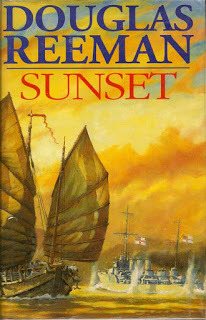
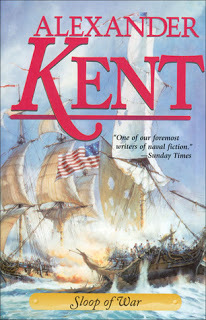 ALL THE GOOD BOOKS—PART TWO In All The Good Books—Part One, I spoke about my eighty-six year old friend Mary’s assertion: You can’t possibly read all the good books—no matter how long you live... As proof of this truth, I wrote about the joys of unexpectedly perceiving a book, a series, or an overlooked author through a different and intriguing prism—opening up a whole new realm of obsessive reading. I also mentioned the companion experience of discovering an author whose books serendipitously enter your orbit with all the subtly of a hurtling giant asteroid. You tentatively try one title and are immediately captivated by a new world and delight in knowing the author has a huge backlist of books waiting for you to explore.
ALL THE GOOD BOOKS—PART TWO In All The Good Books—Part One, I spoke about my eighty-six year old friend Mary’s assertion: You can’t possibly read all the good books—no matter how long you live... As proof of this truth, I wrote about the joys of unexpectedly perceiving a book, a series, or an overlooked author through a different and intriguing prism—opening up a whole new realm of obsessive reading. I also mentioned the companion experience of discovering an author whose books serendipitously enter your orbit with all the subtly of a hurtling giant asteroid. You tentatively try one title and are immediately captivated by a new world and delight in knowing the author has a huge backlist of books waiting for you to explore.
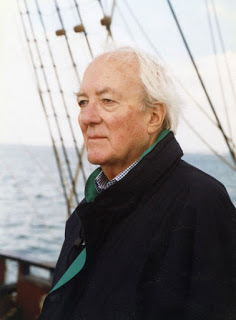 It is rare for this second phenomena to happen to me, but earlier this year I came across the obituary for Douglas Reeman, who passed away on January 23rd. I was aware of Reeman’s highly successful Richard Bilotho series of swashbuckling Royal Navy adventures—written under the pseudonym Alexander Kent—set during the Napoleonic wars. However, in my understanding, these were Horatio Hornblower clones comparable to Patrick O’Brian’s popular Aubrey and Maturin series from the same genre.
It is rare for this second phenomena to happen to me, but earlier this year I came across the obituary for Douglas Reeman, who passed away on January 23rd. I was aware of Reeman’s highly successful Richard Bilotho series of swashbuckling Royal Navy adventures—written under the pseudonym Alexander Kent—set during the Napoleonic wars. However, in my understanding, these were Horatio Hornblower clones comparable to Patrick O’Brian’s popular Aubrey and Maturin series from the same genre.
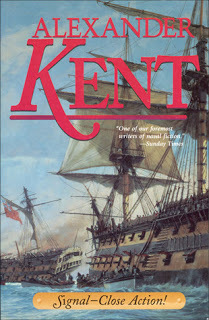 I’d read the Hornblower series in my twenties as well as the men’s adventure paperback original equivalent featuring the meanest bastard to ever sail a Royal command, George Abercrombie Fox (written by the prolific Kenneth Bulmer under his Adam Hardy pseudonym). While Hornblower verges on being classified as literature, the Fox series is as lowbrow as it gets by comparison. Still, I believed I’d read the best and worst of the genre (possibly enjoying the worst more than the best), seen Master And Commander on the big screen (based on a Patrick O’Brian book), and had never been intrigued to dip further into the genre. As a result, Reeman/Kent dropped off my radar.
I’d read the Hornblower series in my twenties as well as the men’s adventure paperback original equivalent featuring the meanest bastard to ever sail a Royal command, George Abercrombie Fox (written by the prolific Kenneth Bulmer under his Adam Hardy pseudonym). While Hornblower verges on being classified as literature, the Fox series is as lowbrow as it gets by comparison. Still, I believed I’d read the best and worst of the genre (possibly enjoying the worst more than the best), seen Master And Commander on the big screen (based on a Patrick O’Brian book), and had never been intrigued to dip further into the genre. As a result, Reeman/Kent dropped off my radar.
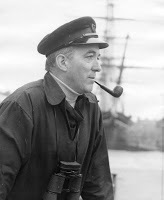 I was vaguely aware Reeman was prolific under his own name, writing three dozen WWII naval action novels. This was another genre I’d studiously avoided as too huge to tackle beyond Alistair MacLean’s The Guns of Navarone and Where Eagles Dare. I couldn’t have named a Reeman WWII title on a bet. In the real world, my career demands I work hard to be non-judgmental and seek understanding of different cultures. Apparently, this trait did not translated successfully to my reading habits—I am sometimes astonished to be confronted by my literary prejudices and my closeminded approach to particular genres.
I was vaguely aware Reeman was prolific under his own name, writing three dozen WWII naval action novels. This was another genre I’d studiously avoided as too huge to tackle beyond Alistair MacLean’s The Guns of Navarone and Where Eagles Dare. I couldn’t have named a Reeman WWII title on a bet. In the real world, my career demands I work hard to be non-judgmental and seek understanding of different cultures. Apparently, this trait did not translated successfully to my reading habits—I am sometimes astonished to be confronted by my literary prejudices and my closeminded approach to particular genres.
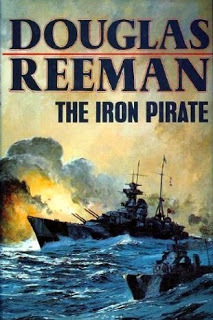 This character flaw is usually brought to my attention by a precipitating event or previously unknown fact. In the case of Reeman, it was a line in his obituary stating he had once been a detective in the London Metropolitan Police force. To be a detective in the Met, an officer would need to have some tenure and make his way up through the ranks from uniformed constable. So, it was reasonable to assume Reeman had spent some time on the job and was another in a long line of cops turned writers—as I am myself. This note of kinship led me to give his WWII novels a try. I started with Sunset, attracted to the novel by the beautiful paperback cover. Set in 1941, Commander Esmond Brooke and the HMS Serpent are send to Hong Kong, which is on the verge of a Japanese invasion the British admiralty unequivocally states will never happen. What follows is an engrossing character study of a leader attempting to protect his men, his ship, and the citizens of Hong Kong from the ignorant superiority of those in charge interested only in protocol and displays of dress whites on deck.
This character flaw is usually brought to my attention by a precipitating event or previously unknown fact. In the case of Reeman, it was a line in his obituary stating he had once been a detective in the London Metropolitan Police force. To be a detective in the Met, an officer would need to have some tenure and make his way up through the ranks from uniformed constable. So, it was reasonable to assume Reeman had spent some time on the job and was another in a long line of cops turned writers—as I am myself. This note of kinship led me to give his WWII novels a try. I started with Sunset, attracted to the novel by the beautiful paperback cover. Set in 1941, Commander Esmond Brooke and the HMS Serpent are send to Hong Kong, which is on the verge of a Japanese invasion the British admiralty unequivocally states will never happen. What follows is an engrossing character study of a leader attempting to protect his men, his ship, and the citizens of Hong Kong from the ignorant superiority of those in charge interested only in protocol and displays of dress whites on deck.
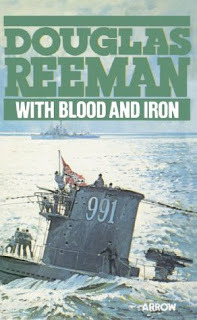 When I turned the last page of Sunset, I immediately began reading another Reeman novel, Dive In The Sun—the story of a British miniature submarine crew in a duel under the Atlantic and their desperate attempt to escape after destroying a key German harbor base. Sunset had enjoyably held my interest, but Dive In The Sun riveted me. This was a return to my beloved High Adventure genre—ordinary men showing extraordinary courage while battling both nature and a deadly enemy under extraordinary circumstances. Over the next few weeks, my stock of Amazon gift cards was mightily depleted as I ordered paperback copies of Reeman’s numerous books in VG condition. I made the decision to go with paper as opposed to e-books since the covers of Reeman’s books are outstanding and part of the pleasure of reading them.
When I turned the last page of Sunset, I immediately began reading another Reeman novel, Dive In The Sun—the story of a British miniature submarine crew in a duel under the Atlantic and their desperate attempt to escape after destroying a key German harbor base. Sunset had enjoyably held my interest, but Dive In The Sun riveted me. This was a return to my beloved High Adventure genre—ordinary men showing extraordinary courage while battling both nature and a deadly enemy under extraordinary circumstances. Over the next few weeks, my stock of Amazon gift cards was mightily depleted as I ordered paperback copies of Reeman’s numerous books in VG condition. I made the decision to go with paper as opposed to e-books since the covers of Reeman’s books are outstanding and part of the pleasure of reading them.
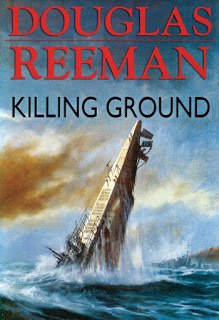 Reeman's debut novel, A Prayer for the Ship, was published in 1958. In 1959, he followed up his debut with High Water, a straightforward contemporary sea going adventure novel. As he explains in the introduction to my edition, he was still learning his craft as a writer and had not yet discovered the strengths that would lead him to the backgrounds and themes of his later books. Reeman’s books break down into four main groups: 26 WWII naval warfare novels (everything from submarines to destroyers to torpedo boats to anything that floats or submerges); 6 standalone action novels from time periods other than WWII; 5 novels in his Blackwood generational saga played out against the history of the Royal Marines; and 30 books under his Alexander Kent pseudonym featuring the chronicles of Richard Bolitho (and later Bolitho’s nephew Adam) battling in Her Majesty’s ships on the High Seas during the Napoleonic wars—a total of 67 books to keep me deep in pages for the foreseeable future and maybe beyond.
Reeman's debut novel, A Prayer for the Ship, was published in 1958. In 1959, he followed up his debut with High Water, a straightforward contemporary sea going adventure novel. As he explains in the introduction to my edition, he was still learning his craft as a writer and had not yet discovered the strengths that would lead him to the backgrounds and themes of his later books. Reeman’s books break down into four main groups: 26 WWII naval warfare novels (everything from submarines to destroyers to torpedo boats to anything that floats or submerges); 6 standalone action novels from time periods other than WWII; 5 novels in his Blackwood generational saga played out against the history of the Royal Marines; and 30 books under his Alexander Kent pseudonym featuring the chronicles of Richard Bolitho (and later Bolitho’s nephew Adam) battling in Her Majesty’s ships on the High Seas during the Napoleonic wars—a total of 67 books to keep me deep in pages for the foreseeable future and maybe beyond.
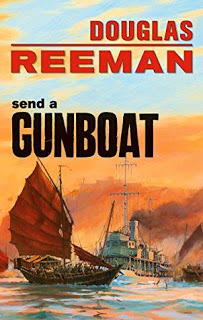 I’ve now read five of Reeman’s WWII books, a couple of his standalones, and the first of his Blackwood saga, and I’ve yet to be disappointed. Each easily passed my twenty-five page test (if I’m not engaged in a book by page twenty-five, it’s tossed in a pile to take to the Friends of the Library) and even my original fifty page test. Last week, it was time to crack open the first of the Richard Bolitho books, Richard Bolitho, Midshipman, from 1975, written under the Alexander Kent pseudonym, which Reeman chose as homage to a friend and naval officer who died during the Second World War.
I’ve now read five of Reeman’s WWII books, a couple of his standalones, and the first of his Blackwood saga, and I’ve yet to be disappointed. Each easily passed my twenty-five page test (if I’m not engaged in a book by page twenty-five, it’s tossed in a pile to take to the Friends of the Library) and even my original fifty page test. Last week, it was time to crack open the first of the Richard Bolitho books, Richard Bolitho, Midshipman, from 1975, written under the Alexander Kent pseudonym, which Reeman chose as homage to a friend and naval officer who died during the Second World War.
 I purposely left the Bolitho series to sample last, still reluctant to return to Her Majesty’s wooden fighting ships, with which I had last sailed under the command of Captain Horatio Hornblower—and a second tour under the lash of the rapacious, court martial dodging, George Abercrombie Fox. My reluctance was, however, unfounded. Seven days later, I have exuberantly battled beside Bolitho through the first four books in the series and stand ready to fight beside him again and again. The Bolitho books not only display the same depth of character and moral quandaries I was captivated by in Reeman’s other works, but there is an additional layer of affection on display in this series. They are clearly Reeman’s favorite children. This is not to disparage his other novels in any way, but his books written as Alexander Kent have something a little extra.
I purposely left the Bolitho series to sample last, still reluctant to return to Her Majesty’s wooden fighting ships, with which I had last sailed under the command of Captain Horatio Hornblower—and a second tour under the lash of the rapacious, court martial dodging, George Abercrombie Fox. My reluctance was, however, unfounded. Seven days later, I have exuberantly battled beside Bolitho through the first four books in the series and stand ready to fight beside him again and again. The Bolitho books not only display the same depth of character and moral quandaries I was captivated by in Reeman’s other works, but there is an additional layer of affection on display in this series. They are clearly Reeman’s favorite children. This is not to disparage his other novels in any way, but his books written as Alexander Kent have something a little extra.
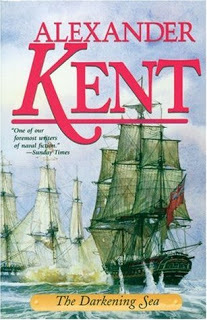 From Bolitho’s prospective, the series takes the reader through the history of Nelson's Navy—from before the American War of Independence to after the end of the Napoleonic Wars. This is a true saga, but these are not tomes filled with dry facts and irritating minutia, there is action, emotion, and color on every page. Sorry, Horatio, but Bolitho could sail circles around you. There you have it, more proof you can never read all the good books. When you are staring at your bookshelves and not a single title is jumping out at you to pick up and read, do not despair. Somewhere, waiting to be revealed to you at the most unexpected moment, is another author, another character, another series, another reading experience to again thrill you with the joy of turning pages. To find out more about Reeman and his novels on the excellent website curated by his wife CLICK HERE DOUGLAS REEMAN CHECKLIST WWII NOVELS A Prayer for the Ship Dive in the Sun The Hostile Shore With Blood and Iron HMS Saracen The Pride and the Anguish To Risks Unknown Rendezvous—South Atlantic The Destroyers His Majesty's U-Boat(aka: Go in and Sink) Winged Escort Surface with Daring Strike from the Sea A Ship Must Die Torpedo Run The Volunteers The Iron Pirate In Danger's Hour The White Guns Killing Ground Sunset A Dawn Like Thunder Battlecruiser For Valour The Glory Boys Twelve Seconds to Live STANDALONES High Water Send a Gunboat The Last Raider The Greatest Enemy Path of the Storm The Deep Silence THE BLACKWOOD/ROYAL MARINES SAGABadge of Glory The First to Land The Horizon Dust on the Sea Knife Edge RICHARD BOLITHO SAGA/ALEXANDER KENT Bolitho, Midshipman Bolitho and the Avenger Band of Brothers Stand into Danger In Gallant Company Sloop of War To Glory We Steer Command a King's Ship Passage To Mutiny With All Dispatch Form Line of Battle Enemy in Sight Flag Captain Signal—Close Action The Inshore Squadron A Tradition of Victory Success to the Brave Colours Aloft Honour This Day The Only Victor Beyond The Reef The Darkening Sea My Country's Freedom Cross of St. George Sword of Honour Second to None Relentless Pursuit Man of War Heart of Oak In the King's Name
From Bolitho’s prospective, the series takes the reader through the history of Nelson's Navy—from before the American War of Independence to after the end of the Napoleonic Wars. This is a true saga, but these are not tomes filled with dry facts and irritating minutia, there is action, emotion, and color on every page. Sorry, Horatio, but Bolitho could sail circles around you. There you have it, more proof you can never read all the good books. When you are staring at your bookshelves and not a single title is jumping out at you to pick up and read, do not despair. Somewhere, waiting to be revealed to you at the most unexpected moment, is another author, another character, another series, another reading experience to again thrill you with the joy of turning pages. To find out more about Reeman and his novels on the excellent website curated by his wife CLICK HERE DOUGLAS REEMAN CHECKLIST WWII NOVELS A Prayer for the Ship Dive in the Sun The Hostile Shore With Blood and Iron HMS Saracen The Pride and the Anguish To Risks Unknown Rendezvous—South Atlantic The Destroyers His Majesty's U-Boat(aka: Go in and Sink) Winged Escort Surface with Daring Strike from the Sea A Ship Must Die Torpedo Run The Volunteers The Iron Pirate In Danger's Hour The White Guns Killing Ground Sunset A Dawn Like Thunder Battlecruiser For Valour The Glory Boys Twelve Seconds to Live STANDALONES High Water Send a Gunboat The Last Raider The Greatest Enemy Path of the Storm The Deep Silence THE BLACKWOOD/ROYAL MARINES SAGABadge of Glory The First to Land The Horizon Dust on the Sea Knife Edge RICHARD BOLITHO SAGA/ALEXANDER KENT Bolitho, Midshipman Bolitho and the Avenger Band of Brothers Stand into Danger In Gallant Company Sloop of War To Glory We Steer Command a King's Ship Passage To Mutiny With All Dispatch Form Line of Battle Enemy in Sight Flag Captain Signal—Close Action The Inshore Squadron A Tradition of Victory Success to the Brave Colours Aloft Honour This Day The Only Victor Beyond The Reef The Darkening Sea My Country's Freedom Cross of St. George Sword of Honour Second to None Relentless Pursuit Man of War Heart of Oak In the King's Name
Published on May 05, 2017 09:18
No comments have been added yet.



